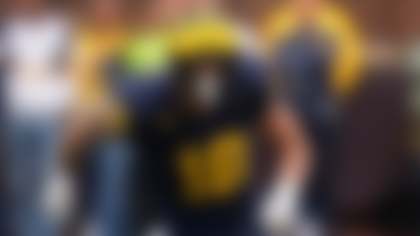One of Eli Manning's last days as a New York Giant was wholly in keeping with the hundreds that had come before. On the Monday after the Giants' 2019 season ended, hours after coach Pat Shurmur had been fired, Manning stood at his locker and calmly discussed the wrenching decision he faced. That was Manning's career in New York in a nutshell, quiet and measured and willing to stand in the glare of the spotlight and coolly assess the situation in the Southern drawl that for 16 years belied his intensity.
In this case, the situation was his decision about his own future. If Manning was rattled by the choice in this moment -- to retire or do what he has always said he could never imagine doing, play elsewhere -- he did not show it. He talked about choosing to remember the many good times, like the two championships, and not the bad, like when he was benched for Geno Smith two years ago, which elicited tears, and then, finally, when he was benched for Daniel Jones early in the 2019 season.
The twists of football and Jones' ankle allowed Manning a good ending, the kind everyone around the Giants ached for. He started two more games and won his final one, his parents applauding from a box, his children waiting to greet him, the home fans giving him the kind of applause he deserved and had not heard enough of in recent years. The finality of that moment was lost on nobody, least of all Manning himself. Pictures were taken, game balls were issued, a game of flip cup went viral. This was unmistakably a valedictory. But by the time he was asked if he knew yet what was next, Manning had returned to the same economy of emotion that had been his public countenance his entire career. He stood in the same spot he did every Monday after a Giants loss.
"I think I can still play but I'll figure everything out," Manning said.
From the very start of his NFL career to this week's retirement, the youngest Manning -- possessed of an aw-shucks shrug and the ability to be eternally available while saying not much at all -- was comfortable operating under pressure. He chose to go to Ole Miss, in the footsteps of his beloved father, Archie. He forced a draft-day trade to the Giants by making it clear he had no interest in joining the San Diego Chargers. He spent his entire career being compared to his older brother, Peyton. It turned out that the quiet steeliness made him perfectly suited for New York. When former teammate Tiki Barber mocked in 2007 Manning's early leadership attempts as "comical," Peyton was furious. Eli had to be prodded to respond.
Manning was not the biggest star or the greatest player the Giants have ever had. That was Lawrence Taylor. Manning, in fact, has an odd resume. His career regular-season record is exactly 117-117, and it is hard not to notice how many of those losses came in recent years. He is one of just 12 quarterbacks since 1950 with at least 200 starts -- he made 210 straight starts before the 2017 benching that crushed him and led to Ben McAdoo's demise -- but he had only the 11th-highest winning percentage among those 12. He had seven seasons in which he threw for at least 4,000 yards and three in which he had at least 30 touchdown passes. But he also led the league in interceptions three times. He had eight playoff victories, but they came in just two postseasons. In four other seasons, the Giants were one-and-done in the playoffs. In Manning's other eight seasons as the full-time starter, the Giants missed the postseason entirely and in recent years, that ramped up chatter about finding his successor. When the Giants finally did, drafting Daniel Jones with the sixth pick overall last year, Manning's benching was inevitable.
What made it so melancholy, though, for Manning certainly, but also for team co-owner John Mara and the less vitriolic fans, were those two postseasons. Manning's flat-line persona may have driven crazy fans who wanted him to burn as heatedly and publicly as Peyton, but it gave Eli a rare and valuable gift: He was able to perform his best at the biggest moments on the klieg-lit stage. He seemed to luxuriate in the anonymity that New York affords even the most famous, but he flourished when all eyes were on him.
Manning authored two of the most memorable runs to Lombardi Trophies in NFL history. For that, and his genial demeanor, he is a Giants favorite son, the one Mara had tears in his eyes for after watching Manning's last start.
Manning's entire career was encapsulated in a singular moment of duress. Just a few months after Barber had issued his barbs, Manning had the Giants in the Super Bowl. He had bested Brett Favre in a frigid NFC Championship Game without wearing a glove. Now it was third down, in the final minutes of Super Bowl XLII, with the Giants trailing the undefeated New England Patriots. This was to have been a coronation as the greatest team for the Pats, and they had already beaten New York to finish a perfect regular season. Manning was being swallowed up by New England's pass rushers, but he somehow managed to pull out of the grasp of two of them, stumbling to his right. He heaved the ball down the middle of the field, where it settled onto David Tyree's helmet and into football lore. A few minutes later, the Patriots were no longer perfect and the Giants had pulled off one of the biggest upsets in NFL history.
Mara called it the greatest victory in team history.
Four years later, Manning threw an even better pass, a once-in-a-lifetime drop in the bucket to Mario Manningham tap dancing along the sideline, and the Giants won Super Bowl XLVI, too. In those two postseasons, Manning threw 15 touchdowns and just two interceptions. The Super Bowls, and the game MVP awards that both went to Manning, cemented Eli as the greatest quarterback in Giants history and they are the foundation upon which his Hall of Fame candidacy will be built.
His final season was undeniably painful and maybe the Giants let their hearts make the decision about how to make the transition. Rather than starting Jones immediately, New York went with Manning to open the season with the expressed hope that Eli and the Giants would be doing so well that Jones would never have to play. Manning was benched after just two games -- he had hoped for more -- and he virtually disappeared from public view. When Jones won his first start, thanks in part to a missed last-second field goal by the Tampa Bay Buccaneers, Manning exulted with the rookie QB, but then made sure he was gone from the locker room by the time reporters arrived. There would be no public cataloging of his expressions and moods. Manning was not heard from again until he had to make another start, when Jones hurt his ankle. And, in a full-circle moment that gave everybody evidence he was as good a teammate as we'd always been told, the video surfaced of Manning drinking beer in a Hoboken bar, tossing napkins in the air, Jones at his side. That, as it turns out, was also a clue that the end was near -- a mid-career Manning would never have let himself be videoed like that.
On what everybody knew would be his last normal day as a Giants player, Manning stood again in front of his locker and said he thought Jones would be much more comfortable next season, the same as Eli had been after a miserable rookie year, when he went 1-6 as the starter after replacing Kurt Warner. In his second season, the Giants went 11-5 and won the division.
In Manning family lore, it is no secret that Eli is most like his mother, Olivia. Both were quieter than Manning's voluble older brothers, Cooper and Peyton, and their father, Archie. Eli and Olivia grew especially close when Eli was in high school. And if Eli had the same penchant for practical jokes as Peyton did, he also had Olivia's gentle demeanor. It was, it turned out, the perfect way for a Giants quarterback to ride the ups and downs of a career in the din of New York. The NFL and New York vibrated around Eli Manning, but he never shook.
He was asked the day after the season finale what he was most proud of, and Manning gave exactly the answer you would expect of him.
"It's easy to say the championships, and I think those are special memories," he said. "I think just the work every day, came in committed to getting better and finding ways to win games and to improve myself and improve my teammates. I'm proud of the friendships and being a good teammate to all the guys that came in here. Trying to help out anybody who needed help and work. I think the commitment was there and sometimes you got the result, sometimes you didn't. I think I always gave myself, this team and this organization everything I had."
Follow Judy Battista on Twitter @JudyBattista.












